I wrote this paper a several years back while in school. I think some of this is still valid today, so I’ve ported it over to this site
GAMING ADDICTION:
What is it and how do we deal with it?
Gaming Addictions
Brian Hawkins
CIS 436 Term Paper
Abstract
As the Internet and Computers are integrated to every aspect of our lives, it is inevitable that not all outcomes will be positive. One negative prospect is addiction. As with other addictions, there are symptoms such as: mood swings, irritability, and fatigue. There can be other results of an Internet or gaming addiction as well. In severe cases, job loss and interpersonal relationship issues (friends, spouses) are both possible outcomes for addicts. Computer and Internet addictions can affect people from all walks of life, but does it affect certain segments of the population more heavily? Technology addictions have been compared to other addictions and some claim the issue is not technology. Some experts believe that addicts have other personality disorders and technology is just the method they are channeling their addiction through. As with other addictions, there are treatments available. Such possibilities as counseling or even boot camps exist to help rid one of an addiction.
Gaming Addiction
We live in a society where technology is constantly evolving. As a result, our lives and how we interact with everyday tasks change frequently. One technology that has evolved drastically over my lifespan is the use of computers for entertainment, specifically gaming. As with any technology or change there will be both positive and potentially negative results from its use.
On the positive side, a multi-billion dollar industry has evolved from the use of computers for gaming. This includes familiar names such as Nintendo, Sony Playstation, and Microsoft Xbox. But it also includes game publishers EA and Activision, and many retail outlets such as GameStop and Amazon.com. There has also been much debate about the possibility of positive effects on gamers. In a recent article by Graft (2009), numerous benefits of gaming were noted. Games have been used in physical rehab, and to assist burn victims as a distraction from pain. Hand-eye coordination, problem-solving skills, and quick decision making may also be affected by gaming.
On the other hand, any benefits of gaming are likely to be negated by excessive use. Spending a whole weekend gaming with friends may be slightly excessive but likely harmless. The trouble may begin when gaming becomes an addiction. What exactly is a gaming addiction? According to Merriam-Webster’s Collegiate Dictionary, an addiction is the “compulsive need for and use of a habit-forming substance (as heroin, nicotine, or alcohol) characterized by tolerance and by well-defined physiological symptoms upon withdrawal.” While that term is generally used in reference to drugs or alcohol, it can also apply to other aspects of life such as gambling, eating, sex, work, Internet or video games.
Addiction may or may not be easy to spot depending on the severity. A gaming addiction will be generally associated with compulsive use of a computer or video game system. According to Dr. Maressa Orzack, a doctor specializing in computer addictions, various physical symptoms can result from this excessive use (1998). Carpal tunnel syndrome can be a direct result of the hardware use. Migraine headaches can be caused by staring at the screen for long periods of time without blinking. This may also cause vision problems. Weight gain or loss may occur as some people skip meals while others eat excessively with little physical exercise.
| Figure 1 : Study Conducted by AOL Games shows behaviors exhibited due to gaming habits. (LeClair, 2006) |
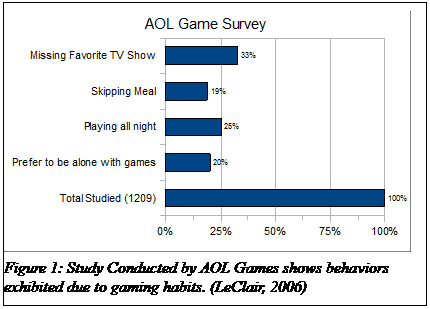
Other symptoms may arise as a result of a gaming addiction that may not be so visible. Addicted users may only display symptoms when they are not able to partake in these activities. Irritability, anxiety, or depression may occur when addicts are ‘disconnected’ for long or sometimes even short periods of time (Orzack, 1998).Deaths have even resulted from gaming addictions (BBC News, 2005).
A study was conducted by AOL Games on the issue of gaming. The study consisted of 1,209 people aged 14 to 55 years old who played games on a PC, Console, and/or Cell Phone. Figure 1 shows these results. While most considered their gaming “casual recreation”, approximately 10 percent of those studied admit to being addicted to gaming. Interestingly, more than the 10 percent exhibit some sign of addiction. Thirty-three percent admit to missing a favorite TV show, 19 percent have skipped a meal and 25 percent have stayed up all night playing games. At a detriment to any social interaction, 20 percent said if they were stranded on a deserted island they would prefer to have video games. Any one of those scenarios occurring occasionally doesn’t necessarily indicate addiction, but frequent occurrences could indicate an issue.
A report published by Council on Science and Public Health (CSAPH) found that 70-90% of youth in the U.S. plays video games. Similar to the AOL report, it estimates that about 10-15% of those players display symptoms of gaming addiction (Kahn, 2006).
The results of living with this type of addiction can extend well beyond just physical effects. This can have effects both financially and socially as well. Employees have been terminated for excessive Internet usage or gaming at work. One employee was caught using the Internet for personal reasons nearly 50 percent of her work time (Young, 1996). Few bigger economic impacts exist than losing a job.
There can also be social fallout as a result of a gaming addiction. One child went from being a high achieving sixth grader to a violent eleven year old. He began skipping school and ignoring homework assignments. His mother repeatedly found him up playing at late hours of the night. In an attempt to regain control his mother began restricting access to gaming. He began having violent fits; to include throwing his grandmother down the stairs, and hitting his mother several times (LeClair, 2006).
| Figure 2 : Displays changes in relationships as reported by spouses of addicted gamers. (Northrup, 2008) |
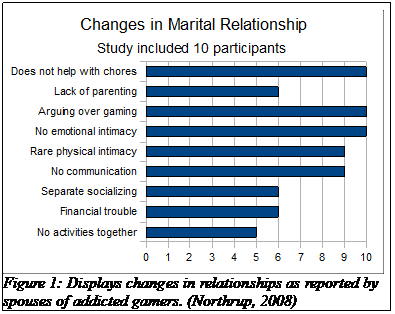
Another type of social fallout from addiction can be seen by the existence of the GamerWidow.com website, and others like it. Online communities have grown around the theme of becoming a Gamer Widow. These ‘widows’ are characterized by their feelings of a deteriorating relationship while their significant other spends most of their time playing games. These spouses may have feelings of loneliness and rejection, as their loved one spends more time playing games than with them. Feelings of frustration may also appear as the abandoned spouse take on increasing household and family duties as the addicted gamer shuns his or her responsibilities (Northrup, 2008).
Figure 2 displays some of the results from a study conducted by Jason Northrup at Texas Tech University for his Dissertation in Marriage and Family Therapy. The study involved 10 participants who were self proclaimed ‘Gamer Widows’. His study illustrates that the lives of those close to gaming addicts can really be affected as well. All participants expressed concern for the lack of effort put forth by the gamer toward both household responsibilities and the marital relationship. Nearly all of the participants expressed decreased level of communication and intimacy as well.
Spouses aren’t the only ones who can suffer due to addiction. Recently in Nevada, a couple was charged with Child Neglect as a result of their online gaming addiction. The parents spent most of their time online playing games such as “Dungeons & Dragons”. Due to the couple’s excessive gaming, their children were left to take care of themselves. The children were 11 and 22 months old. When the children were found by a social worker, they were taken and put in foster care. The state of the children at that time was disgusting. Both children were severely malnourished and had various infections. The older child had problems walking due to muscle weakness (Smith, 2007).
When talking about gaming addiction, it is important to take a look at some demographic data. This can help us spot patterns and possible indicators. Figure 3 displays some data taken from a PEW Internet study conducted in January 2009. Age is definitely a factor to consider when looking at Internet or gaming usage. Younger Americans are more likely to be active Internet users. This is likely due to the fact that computer technology was not widely available until approximately 20 years ago. The younger generations have grown up with technology making them more comfortable with it. A smaller portion of older Americans make an attempt to learn new technology. As a result of more Internet users being young, the percentage of online gamers also decreases as age increases.
| Figure 3 : Percent of adults who game, by age. (Lenhart and Jones, 2008) |
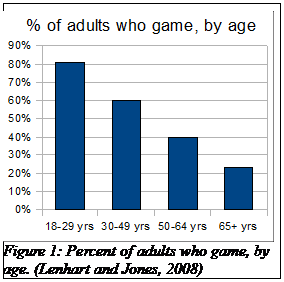
| Figure 4 : Percent of adults who game, by income (Lenhart and Jones, 2008) |
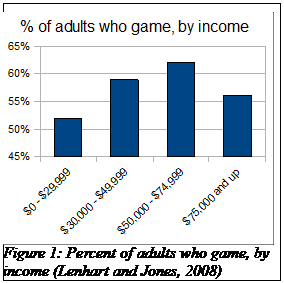
The PEW group published data on other demographic differences as they relate to adult gamers as well. Some of this data is displayed in the following graphs, labeled as Figure 3, 4 and 5.
| Figure 5 : Percent of adults who game, by education. (Lenhart and Jones, 2008) |
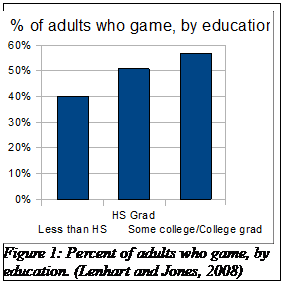
Not surprisingly, the percent of adult gamers decreases with age. This is a similar trend to Internet usage. However there are a few unexpected trends that emerge from this data. There is a noticeable difference in percent of gamers among education levels. Those with higher levels of education are more likely to be gamers. Similarly, higher income levels point to a higher percentage of gamers. That trend breaks when looking at income levels above $75,000 per year. It would be interesting to see if that is due to more demanding jobs at that income level.
Other aspects of this study looked at influence by race, sex, and locale. Adult males were slightly more likely to be gamers, as were adults living in urban areas. Those living in rural areas were about 5-10% less likely o be gamers than those living in the city. According to this study, race does not appear to have an effect on the overall percentage of those playing games. It does however seem to have an effect on what types of devices are used for playing games. Non-white gamers are approximately 10 percent more likely to use portable gaming devices.
These statistics don’t directly indicate rates of addictions. However, they help point to certain demographics that are more likely to use these technologies which can become addictive. Due to sheer exposure it is more likely that a gaming addict will be younger, but there is still possibility for older Americans to fall into this category. This data also points the increased likelihood of addicts being those who are more educated and make between $30,000 and $75,000 per year.
People who have more exposure to the games might be more likely to become addicted, but is it technology’s fault? Marriage Family Therapist and gamer, Shavaun Scott, makes some good points about why some people become addicted to games. People with anxiety disorders may avoid in-person interaction with others due to the stress around these encounters. An online game may allow that much needed interaction while removing some of the related stress. Many players turn to games as a temporary escape from life. Those who have trouble coping with life problems or stress may see this as their only escape and play excessively (Scott, 2007).
In that interview she also admits the fact that some games, in particular MMO’s (Massive Multi player Online games) do have some addictive qualities. Many of these games are designed to reward players for accomplishing tasks. Players are given points, gold, treasure, new powers or skills, and are given the feeling of advancement (Scott, 2007). Perhaps some players are lacking this feeling of success in real life.
A related aspect she touches on is how science relates to the addiction. A chemical called dopamine is released by the brain when a person experiences pleasure. The theory is that some people don’t naturally produce enough dopamine. As a result, those who are deficient may have difficulty being happy or excited. A game may cause a person to become excited, causing their brain to produce dopamine. Because of this satisfied feeling they experience, the person will continue playing. Their brain may actually become dependent on that game to produce dopamine, causing the player to become dependent on the game (Scott 2007).
In her video interview, Shavaun Scott (2007) notes that in order to find an effective treatment, it is important to know the reason gamer is playing. Some gamers play because they are good at it and enjoy the feeling of winning. Others play to make friends or meet people. Some even play because they gain a sense of power. Many times people become addicted because the game provides something that is missing from the person’s real life. One thought is that some players so easily become addicted because of vulnerabilities in their life or personality. An interesting thought that makes it more difficult to place blame. Is it the fault of the technology or of the person? Perhaps it is a combination of both?
No matter the cause, the key is finding a solution. In her interview, Ms. Scott (2007) also mentions the importance of self-monitoring. This is an important skill to have that allows people to participate in activities without becoming addicted. In the case of children, it is important for parents to put guidelines and limitations in place. This helps teach kids to use technology reasonably. In the case of adults, gaming or Internet usage becomes problematic when the user stops functioning in life. She states that it is important to not take over these life functions (job, parenting, chores, providing for family, etc) from the person. It is important that they see the results of not being responsible. The hope is that they realize the problem and can work to correct these issues.
One treatment option that is evolving for this type of disorder is the Boot Camp. In China, they have opened military style boot camps to treat “non-material” addictions such as Internet, gaming, work, sex, and shopping (Adams, 2009). The patients are treated with a combination of military training, counseling, physical activities, and medication.
Another possible process for treating an Internet or gaming addiction is described by Northrop (2008). This starts with taking a look at family history. As mentioned previously, addicts might also exhibit symptoms of other disorders such as depression or social anxiety. If that is the case, it is important for those issues to be addressed simultaneously. The next step is the “detox” phase. The addict needs to be separated from their tormentor (Internet or game). Family members need to be involved in creating a supportive environment and to help the addict remain abstinent. Following this stage, will likely be much emotional turmoil. It is important that the addict find ways to cope with the emotions they are having. One positive way includes opening (or re-opening) a channel of communication with the spouse to express feelings and emotions. Recovery groups for gamers may also be an option to explore. It can be helpful to have people around who have been in similar situations; this can assist the healing process.
As we can see, the computer gaming industry is a far reaching industry. A large portion of the population play games of some type, from children to senior citizens. There can even be some physical or mental benefits from gaming. In some cases, gamers can become addicted to this technology. This can not only hurt their internal and external health, but that of those around them. Children can be neglected and spouses can feel ignored, becoming “gamer widows”. There are ways to reduce the likelihood of becoming addicted. Children should be taught limits and learn responsible use of technology. Adults should be held accountable for meeting their responsibilities. Addicted gamers of all ages can be helped with counseling and treatment. Extreme cases may even require boot camp type treatment where they are removed from the technology.¨One of the most important pieces is that the addict is surrounded by supportive family.¨
References
Adams, Jonathan. (2009, Jan 6).
In an increasingly wired China, rehab for Internet Addicts. Retrieved from:
http://www.csmonitor.com/2009/0106/p01s03-woap.html?page=1
BBC News. (2005, Aug 10).
South Korean dies after game session. Retrieved from:
http://news.bbc.co.uk/1/hi/technology/4137782.stm
Graft, Kris. (2009, Feb 6).
The 15 Clearest Benefits of Gaming, Retrieved from
http://www.edge-online.com/features/the-15-clearest-benefits-gaming?page=0%2C0
Jones, Sydney & Fox, Susannah. (2009).
PEW INTERNET PROJECT. Retrieved from: http://www.pewinternet.org/pdfs/PIP_Generations_2009.pdf
Khan MD PhD, Mohamed K. (2006). CSAPH Report 12-A-07.
Emotional and Behavioral Effects, Including Addictive Potential, of Video Games. Retrieved from:
http://www.ama-assn.org/ama1/pub/upload/mm/467/csaph12a07.doc
LeClair, Jennifer. (2006, Sept 13).
Warning Signs Appear Along Road to Video Game Addiction. Retrieved from: http://www.technewsworld.com/story/52916.html
Lenhart, Amanda, & Jones, Sydney & Macgill, Alexandra Rankin. (2008, Dec 7).
Adults and video games. Retrieved from:
http://www.pewinternet.org/pdfs/PIP_Adult_gaming_memo.pdf
Merriam-Webster’s Collegiate Dictionary. (2000).
United States: Merriam-Webster, Incorporated.
Northrup, Jason C., M.M.F.T. (2008, Dec).
Gamer Widow: The Phenomenological Experience of Spouses of Online Video Game Addicts. Retrieved from: http://etd.lib.ttu.edu/theses/available/etd-10232008-212642/unrestricted/Northrup_Jason_Diss.pdf
Orzack, Maressa Hecht. (1998, Aug 1).
Computer Addiction: What Is It? Psychiatric Times. Vol. 15 No. 8. Retrieved from: http://www.psychiatrictimes.com/display/article/10168/54286
Scott , Shavaun (Interviewee). (2007, June 9).
Video Game Addiction? Part 1 of 4. Retrieved from:
Scott , Shavaun (Interviewee). (2007, June 9).
Video Game Addiction? Part 2 of 4. Retrieved from:
Scott , Shavaun (Interviewee). (2007, June 9).
Video Game Addiction? Part 3 of 4. Retrieved from:
Scott , Shavaun (Interviewee). (2007, June 9).
Video Game Addiction? Part 4 of 4. Retrieved from:
Smith, Laura. (2007, Jul 17).
Couple Facing Child Neglect Charges Due to Internet Addiction. Retrieved from:
Young, Kimberly S. (1996, Aug 15).
INTERNET ADDICTION: THE EMERGENCE OF A NEW CLINICAL DISORDER.
CyberPsychology and Behavior, Vol. 1 No. 3. Retrieved from:
http://newmedia.cityu.edu.hk/en5608/readings/newdisorder.pdf
